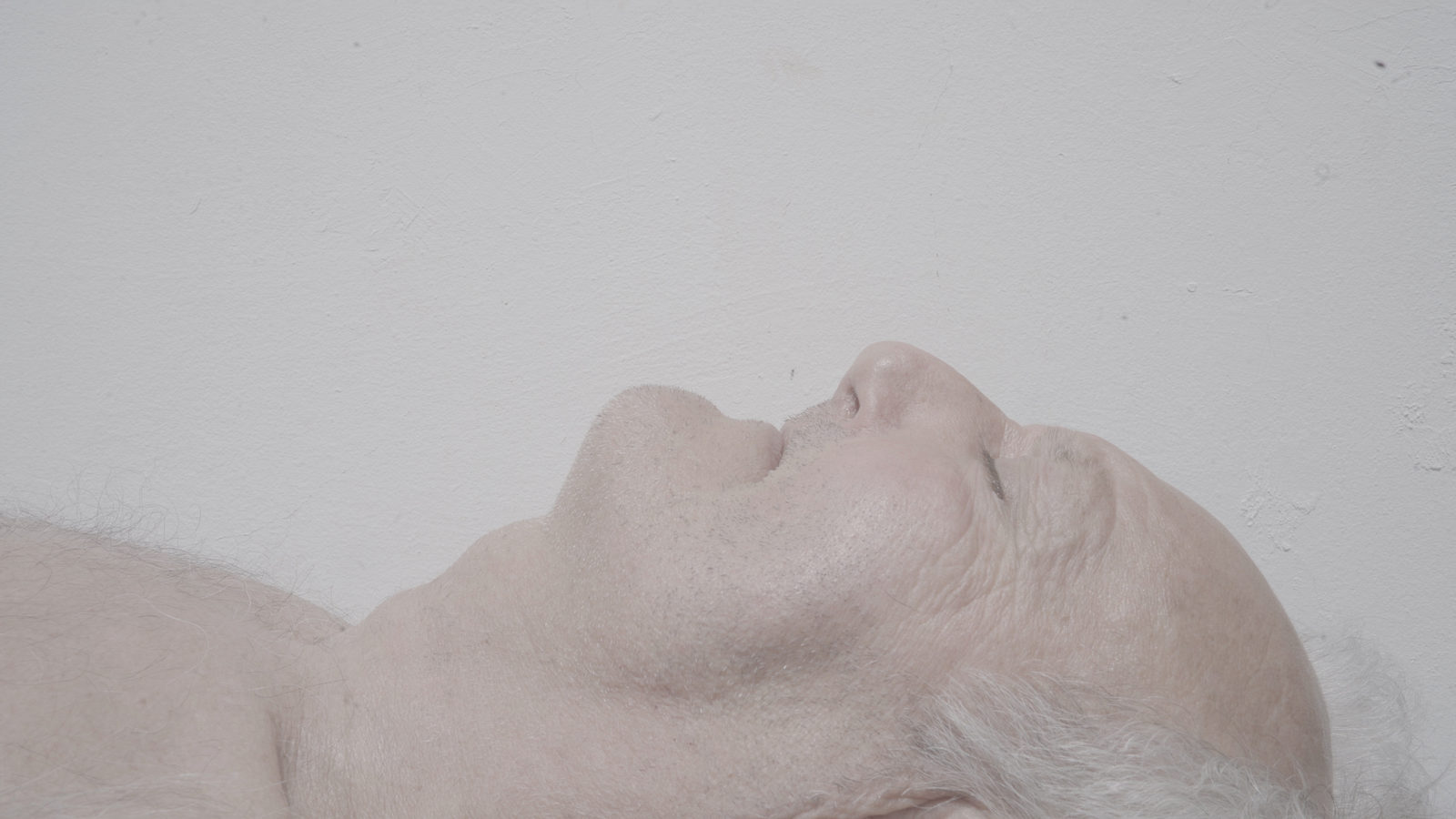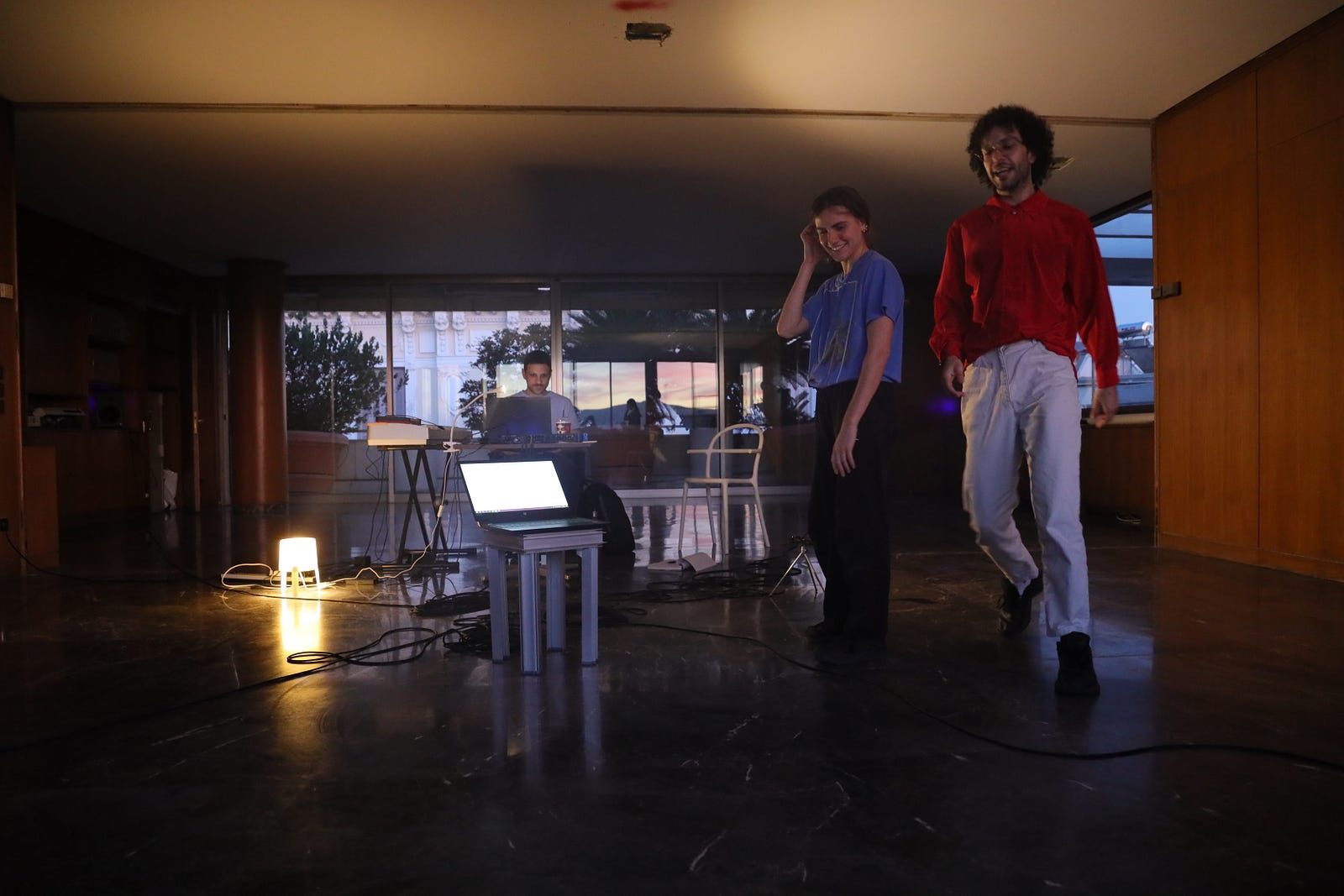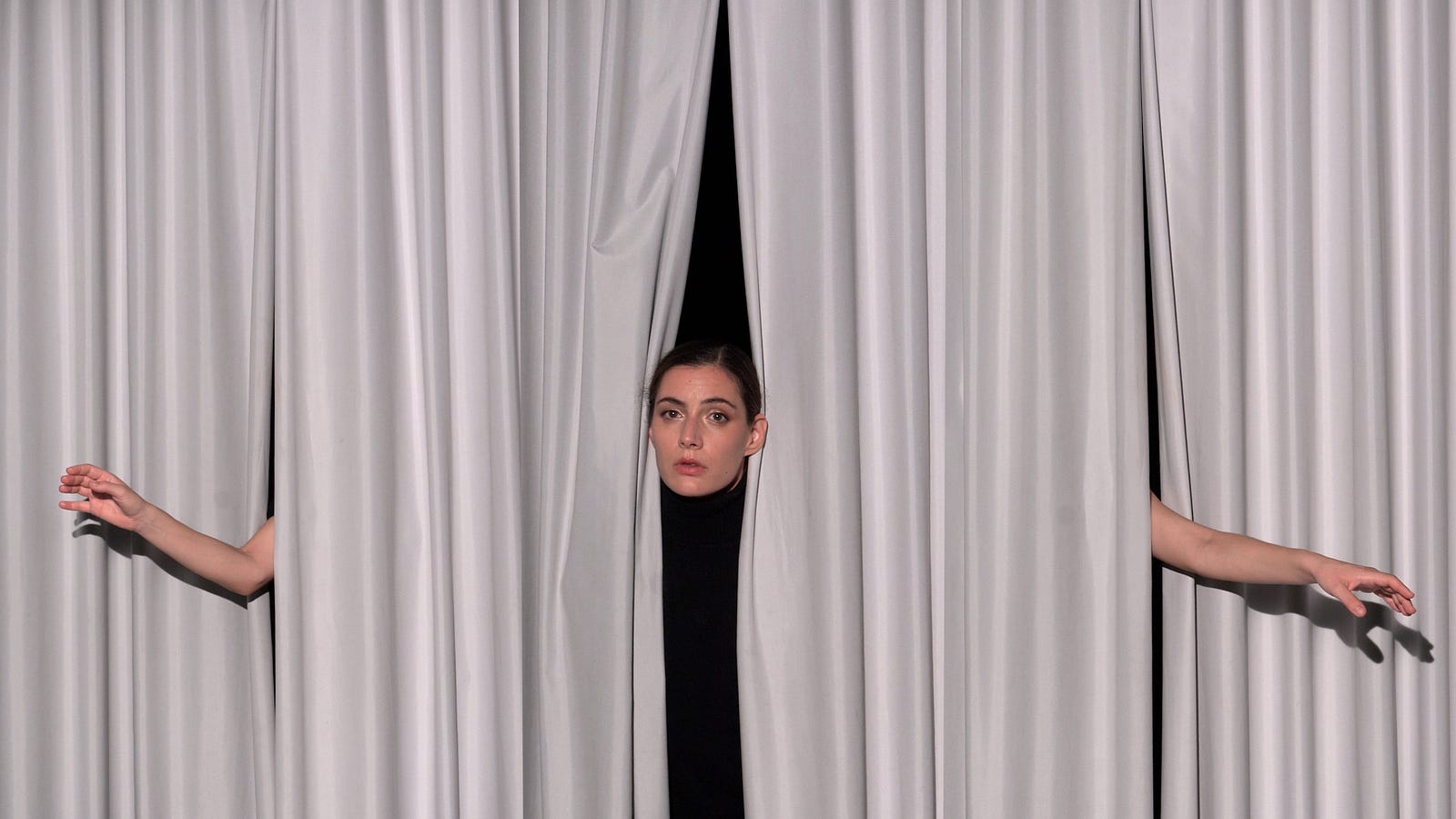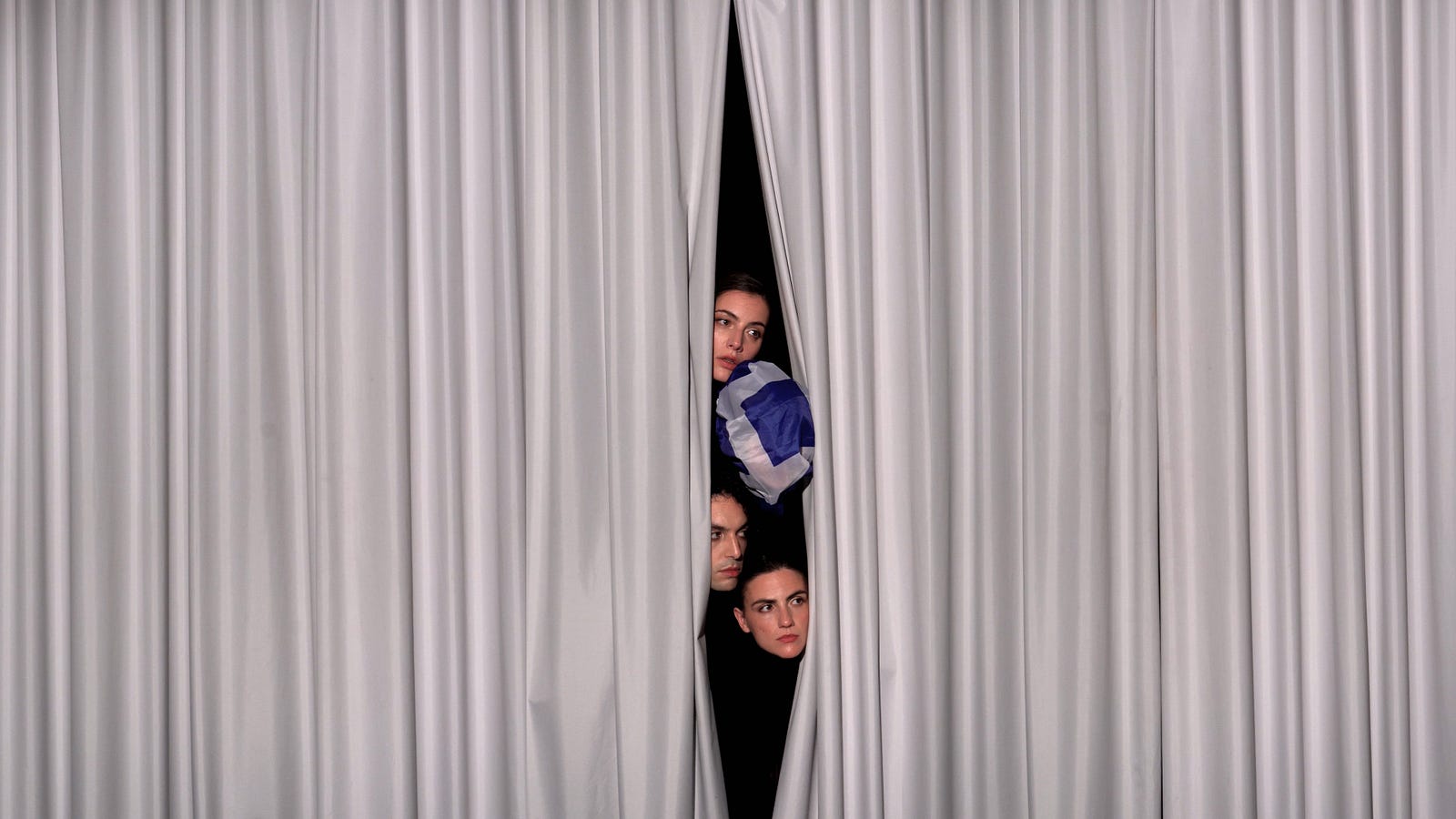04.12.2023
Nicolas Vamvouklis in conversation with Angelos Papadopoulos
Χορος
Γλώσσα πρωτότυπου κειμένου: Αγγλικά
Nicolas Vamvouklis (NV): I’d like to start with your long-term work “We Need to Talk about Father,” which takes different forms along the way. I personally look forward to its presentation at the Athens Conservatoire for the “Art, a Silent Revolution” program I curate, addressing themes of violence, inequality, and stereotypes. What is the next step of this ongoing ‘practice’?
Angelos Papadopoulos (AP): The “We Need to Talk about Father” practice began as a personal need to meet my father (literally and on any other level). I use the term ‘practice’ because this project has existed in many formats; it was my thesis project for the MRes I attended at Roehampton University (London) with a solid theoretical approach, and it was presented at the Lycabettus (Αthens) and Stray Art (Syros island) Festivals in public spaces as well as in one-to-one research meetings, in a Zoom call and others. With the assistance of dance researcher Daphne Pantazopoulou and my professors Tamara Τomic-Vajagic and Nic Conibere, an interactive practice has formed. Written and oral interviews with the audience about fatherhood, the father’s body, and how movement -dance- can interpret traumas and desires are at the core of the practice.
I will literally meet my father on stage for the “Art, a Silent Revolution” program and dance together. I kind of dream of this encounter, and it scares me at the same time since we will do very few rehearsals before we meet on stage. My father is an artist in his own way but not a professional one, so I don’t want to limit him with too many technical directions. I named this part of the practice “the kids performance” as hopefully we will both play. Let’s see the impact of this encounter… I’m pretty sure that the stereotype of father will be addressed.

NV: Can you elaborate on how this endeavor surpasses the conceptual realm and delves into the lived, relational experience of having a father?
AP: Through my experience, it seems that we name father (or mother since it is not a matter of gendered social behavior) whoever embraces us generously and without self-interest; we call father something ideal, something non-existent. Growing older, due to various factors, including inter-generational history, economic circumstances, cultural norms, and sexism, among others, we realize that our father is a flawed human being. Then, we are searching our father in friends, lovers, etc. We are striving for a shelter, a utopia. If we are strong and lucky enough, we can forgive them for their mistakes and liberate ourselves from the past. At some point, we all suffer or have suffered from fatherhood, a practice participant shared once. I’m generalizing, so what follows needs careful thinking, but the previous generation of fathers probably didn’t learn to cry because any sign of sensitivity meant weakness. I now constantly reconcile with my father; I bring him into almost all aspects of my world. Since I stay close to him, I notice that as he becomes weaker physically and mentally due to age, the more sensitive he gets. That moves me, and I’m craving to know them better.

NV: At the moment, you are also participating in the EXPERIMENT B Residency at Flux Laboratory Athens, which is dedicated to the synergy between choreography and science. Could you tell me a bit about this collaborative project?
AP: We were delighted to secure the residency at Flux Laboratory Athens through an open call, and it’s noteworthy to emphasize its meritocratic nature, as it continues to hold significance within Greek standards. Together with Konstantinos Bakogiannis (MEng, MA, PhD; Sound and Music Computing) and Pagona Bulbasakou (dancer/performer), we explore spatial immersive sound design in choreography. I want to mention that the Flux Laboratory Athens is one of the few institutions in the country that provide dance artists with space, time, infrastructure, and resources to engage with new experimental ideas creatively, and we thank them for that.
In the art of dance, sound and movement are in mutual dialogue, forming a multi-layered experience for both performers and audience. This conversation is made possible by utilizing sound’s basic and most recognizable characteristics, such as rhythm, melody, volume, style, etc. Another characteristic of sound is its placement in space, an active and popular element of contemporary sound and music creation. In this residency, we experiment with how the spatial dimension of sound can enrich the sound-movement dialogue using both natural sound sources and electroacoustic media. How is a performer’s dance affected when the sound travels to different sources or the sound sources are not fixed in space?
NV: Angelos, how do you see technology reshaping the choreographic landscape in this digital age? How do you perceive its influence on both the creative process for choreographers and the overall experience for audiences?
AP: Technology is shaping the future of how we tell stories, and it already has changed how the body moves within a choreography. How you tell a story is partly the story itself and concepts like immersion (as a spectator, I do not see the artwork from a distance, but I am immersed in the space of it, I become part of the work) and interactivity (the audience and performers influence the action of the artwork) will gain traction in dance.
More and more, I allow technology to inform me and my collaborators in the creative process. Easy access to archives, AI-generated songs, YouTube videos, online libraries, spatial sound design, and Zoom calls are part of a regular research ‘rehearsal.’ However, no matter where and when technology leads us, both as a creator and an audience member, I always seek intimacy and connection. Due to its ephemeral nature, I may conservatively believe the live-performing body has a uniquely fragile effect that will stay irreplaceable and timeless.

NV: While speaking, I’m casually scrolling down your Instagram account. I’m back in 2020, and there is a portrait of yours in a cute dress along with the caption, “Θέμα τύχης.” Do you consider yourself to be lucky?
AP: I’m laughing to myself. I didn’t expect this question. [moment of deep introspection and silence] With a bit of disappointment and a smile, I admit that I considered myself very lucky. It was the perfect delusion to survive and move on. [big smile] Now I’m working my luck, a.k.a. the fruits are real.
NV: I also just noticed that you often use glitter faces in your works, which adds a surreal quality, elevating the performers’ expressions to a level of theatrical magic. What is your idea of transformation?
AP: Transformation is something that I seek daily on and off stage. I start with truth and end up with art (Ocean Vuong quote here). Techniques of transformation, economy of lying, and creation of magic are what we are all looking for in this harsh and pointless life, no? As my artistic language often has something grounded and casual, I love the extreme opposites: how can it be real in surreal make-up or costume? Also, transformation allows me to move from the specific to the general. Once I ‘disappear’ the facial features of a certain person by highlighting them (that’s a paradox I love), I don’t witness them anymore; I see a figure, a symbol, and then they can be as personal as they want. They are not themselves anymore but a nameless person, an idea.
NV: Speaking of metamorphosis, what do you love most about living in Athens?
AP: My partner’s relationship with the city — they are not Greek, so they first loved Athens, then hated it, and are now at peace with its contradictions. Plus, my close friends, my family, and, of course, the cliche: sun, food, and surreal everyday incidents. They are all moving and morphing. The art, too! Though I’m usually shocked by its raw face (Athens doesn’t allow you to be in a bubble), I love many things about it.

NV: In which ways does this particular setting inform your current research? Are there any exciting new projects on the horizon that you’d like to share?
AP: I have felt so frustrated by our city and its people, the Greeks in general, that I unconsciously found myself wondering what the point of making art is today. When everything encourages destruction instead of creation, I started a new project to uncover what kind of art will fill the gaps of logic that prevail socially, politically, and economically. With loved ones, Pagona Bulbasakou, Elpiniki Saripanidou, and Elsa Siskou, all great creators and performers — I mention only three names, but there are also others who support our dreams and work — we ask ourselves if there is any point in making art nowadays. This question addresses gender, sexuality, inclusivity, and fear issues. In essence, in this new project called “νόημα queer ιεροτελεστία fusion 1,” I discovered coexistence and how different voices can co-create without imposing. In other words, I’m exploring what is missing from the country’s dominant political and media scene: coexistence despite our differences. I aim to meet with the audience regularly from December 2023 to June 2024, hence the ‘number 1’ in the title.
NV: Wrapping up our conversation with a critical question also inspired by your social media presence: If you were a Spice Girl, which would you be?
AP: I love the question, and am once more laughing out loud. To be honest, although I’ve danced “If you wanna be my lover” a zillion times, at the moment, I am in my Madonna era, so in her words, “Spice who? Bitch, I’m Madonna.” I’M KIDDING! Thank you, Nicolas; I truly enjoyed our talk.
—
Angelos Papadopoulos (Athens, 1991; he/him, they/them) is a choreographer, director, and performer. Angelos’ choreographic and other related digital and performance work aims to create impactful experiences for audiences where the body is foregrounded as a key site of social, political, and aesthetic ideas. The term ‘body’ includes its conscious and emotional aspects and functions. Influenced by the cultural milieu of Athens, his work explores intricate layers of self-hood in the context of cultural background, intimacy, sexuality, and personal displacement. In 2020, he was awarded the Stavros Niarchos Foundation (SNF) Artist Fellowship by ARTWORKS.
Nicolas Vamvouklis is an art curator and writer. He is the artistic director of K-Gold Temporary Gallery and has curated exhibitions at the Mediterranea 19 Biennale, the 7th Thessaloniki Biennale, and Fondazione Sandretto Re Rebaudengo. Since 2016, he has served as senior curator across the Benetton cultural panorama. He has also collaborated with Béjart Ballet Lausanne, Marina Abramovic Institute, Prague Quadrennial, and Triennale Milano. Vamvouklis contributes to art magazines and publications, including The Art Newspaper and MIT Press. In 2021, he was awarded the Stavros Niarchos Foundation (SNF) Artist Fellowship by ARTWORKS.



